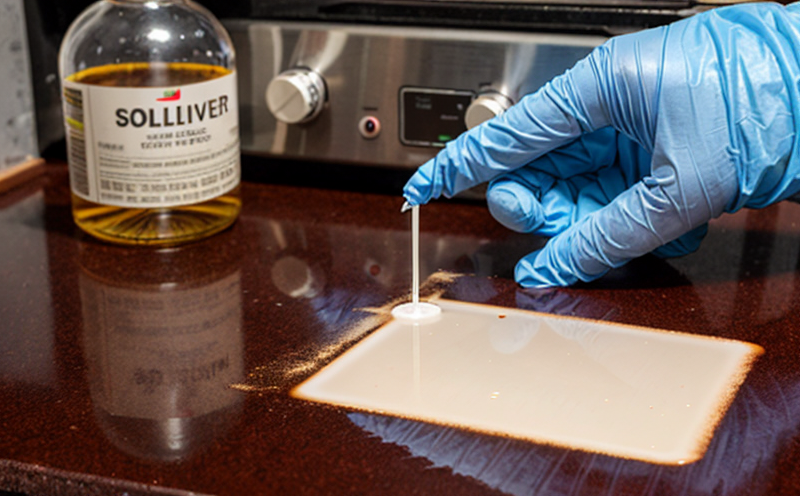Cosmetic Solvent Residue Testing
The demand for high-quality cosmetics has led to a growing emphasis on product safety and compliance with international standards. Cosmetic solvent residue testing is an essential component of this effort, ensuring that products are free from harmful solvents which could potentially cause irritation or adverse reactions in consumers.
Solvent residues can originate from various sources including manufacturing processes, ingredient formulations, and packaging materials. Ensuring the absence of these residues not only enhances consumer safety but also aligns with regulatory requirements set by authorities such as the US Food and Drug Administration (FDA) and the European Commission.
At our laboratory, we employ advanced analytical techniques to conduct this testing. Our state-of-the-art equipment allows us to accurately detect even trace amounts of solvents in cosmetic products. This precision is critical given the stringent requirements for product safety and quality assurance.
The process involves several key steps:
- Sample collection and preparation, which includes ensuring that the sample is representative of the batch being tested,
- Analytical testing using gas chromatography-mass spectrometry (GC-MS), a method widely recognized for its sensitivity and specificity,
- Data analysis to identify the presence or absence of specified solvents,
- Reporting results in accordance with international standards such as ISO 16128:2020.
The importance of this testing cannot be overstated. It plays a crucial role in maintaining consumer trust and ensuring that products meet regulatory requirements. By detecting even trace amounts of solvents, we help manufacturers identify potential issues early on, allowing for corrective actions to be taken before the product reaches the market.
Our commitment to excellence extends beyond just technical expertise. We understand the importance of delivering accurate results within tight timelines. This is why our team works closely with clients throughout the testing process, providing regular updates and ensuring that all queries are addressed promptly.
Why It Matters
The safety of cosmetic products is paramount in today’s consumer-driven market. Regulatory bodies worldwide have stringent guidelines regarding the permissible levels of solvent residues in cosmetics. Compliance with these regulations not only protects consumers from potential health risks but also ensures that companies maintain their reputation and legal standing.
For quality managers, ensuring product compliance is a critical aspect of their role. By conducting thorough solvent residue testing, they can identify any issues early on, preventing costly recalls and damage to brand image. Compliance officers benefit similarly by having reliable data which supports their regulatory submissions.
R&D engineers find this service invaluable as it allows them to refine formulations without compromising safety. Procurement personnel also gain from this testing, ensuring that raw materials do not introduce unwanted solvents into the final product.
Applied Standards
The cosmetic industry relies heavily on international standards such as ISO 16128:2020 for solvent residue analysis. This standard provides guidelines and methods to ensure that the testing process is consistent, reproducible, and reliable.
- ISO 16128:2020: This specifies the procedure for determining the total content of volatile organic compounds (VOCs) in cosmetic products by gas chromatography-mass spectrometry (GC-MS).
- ASTM E394: Another relevant standard used in the US, it provides a method for the determination of VOCs in consumer products using GC-MS.
These standards are crucial as they provide a benchmark against which results can be compared. They ensure that testing is conducted uniformly across different laboratories and countries, enhancing trust and reliability within the industry.
Competitive Advantage and Market Impact
- Innovation Leadership: By being ahead of regulatory requirements through early detection of solvents, companies can innovate safer products faster. This provides a significant competitive edge in attracting health-conscious consumers.
- Brand Reputation: Consistent compliance with international standards enhances brand reputation. Consumers are more likely to trust brands that demonstrate a commitment to safety and quality.
- Market Access: Compliance is often a prerequisite for market entry, especially in regions like Europe where stringent regulations apply. This service helps companies navigate these regulatory landscapes smoothly.
The demand for safer cosmetics is increasing globally. Companies that prioritize solvent residue testing can anticipate higher sales and customer satisfaction. They also reduce the risk of legal penalties and product recalls, which are costly and damaging to a brand’s image.
Our expertise in this area positions us as leaders in cosmetic safety assurance. We support businesses by providing not just technical proficiency but strategic insights into maintaining competitive advantage and ensuring market success.





